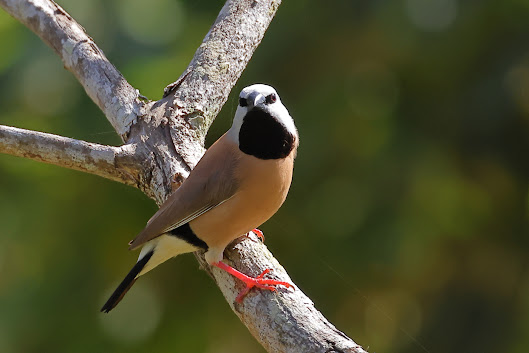 Oh, look, the poor little bird has fallen from the nest. It's fluttered up on to that old birdo's bicycle. Isn't it cute? What shall we do?
Oh, look, the poor little bird has fallen from the nest. It's fluttered up on to that old birdo's bicycle. Isn't it cute? What shall we do?We'd better try to put it back. Pick it up and find the nest. Let's take it home and look after it. Wrong! Wrong! Wrong!
We're so keen to do the right thing we often get it all upside down. Doctors are told (but then sometimes go on to ignore the dictum): First, do no harm.
So it should be with us and wildlife. We almost all know not to get between wild animals and their young. That's because it's dangerous for us. But our thoughts should be first for the good of the young.
So when the above fledgling Rufous Whistler lost a tenuous grip on some outer foliage at Tyto today and fell at my feet, I naturally stepped back to get a picture. And to think about its welfare.
 Yes, in that order and without any thought of saving the bird. That's what parents are for. Right on cue a male whistler turned up. With food in mouth. But it didn't go near the fledgling. It ducked here and there close by. Then it swallowed the caterpillar.
Yes, in that order and without any thought of saving the bird. That's what parents are for. Right on cue a male whistler turned up. With food in mouth. But it didn't go near the fledgling. It ducked here and there close by. Then it swallowed the caterpillar.
What's the problem? I'm probably the problem. Whistlers are trusting birds, but instinct runs counter to heading direct to the young. I back off. Still nothing doing. So I clear right off for 10 minutes.
On return it takes me five minutes to find the 'helpless' fledgling near the top of the tree it fell from. Doesn't seem judging by its fretful calls to be getting all it demands from parents but how's that different from most hungry juveniles? It's safe and sound!
I know, not all cases match such happy outcomes. My principle, though, is always to do as little as possible to interfere - or 'help'. How do others feel?




Very smart! plus a good outcome!
ReplyDeleteCheers, Mick
ReplyDeleteAh that's a tough one. As with everything there are always exceptions. I've looked after injured birds many years ago (with wires) but some of the birds handed in were in good health and were probably just learning to fly and should have been left well alone. I guess we also need to remember that quolls and devils etc need to eat too. How many people feel sorry for that caterpillar in the Whistler's mouth :-)
ReplyDeletePerhaps those who can see caterpillars sitting atop mushrooms and smoking hookahs?
ReplyDeleteHa! I'd reply to that but I'm late! For a very important date.
ReplyDeleteTo ? Tabib:
ReplyDeleteSorry, your comment vanished before my eyes as I was okaying it. I'll blame the system, but it was prbably something I did.
Hi Tony
ReplyDeleteWell, your post is topical for me, as I am now caring for a fledgling Magpie which was blown out of its nest last weekend. I left it there (well, I returned it to the tree). But next day it was down on the ground again.
OK, so I know I can feed it. and keep it alive. But will it learn to hunt for its own feed? I am hoping its instincts kick in - but maybe not.
However, my dilemma was: to leave it on the ground, (or not) - in a park, where people walk dogs regularly.
To leave it on the ground would have meant certain death for the bird. That would seem too callous, to me. To do that would not meet your criteria of "doing no harm".
At least your bird was able to find its way back up into the bush.
Mine was not able to stay where I put it, safely off the ground.
If it had stayed up there safely, I would have been content.
But given that it could not stay there, should I have simply have abandoned it to its (certain) fate?
Cheers
Denis
G'day Tony,
ReplyDeleteI've been a bit tardy in following my favourite bloggers lately - busy as heck here at present.
I can sympathise with your dilemma. Locals sometimes bring me an 'injured' bird or ring to ask what they should do with one. I'm with you, interfere as little as possible.
Regards,
Gouldiae